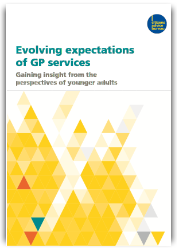Evolving expectations of GP services

In our Evolving expectations of GP services [ 330 kb] briefing note we explore the experience of younger adults (18-34 years) as consumers of general practice medical (GP) services. The analysis was motivated by two concerns:
- First, in the last five years there has been much debate about a generational divide in decisions made about welfare spending and the design of welfare support. Arguments about intergenerational inequality play out nationally, but we also see them locally in our work.
- Second, we see daily in our own work at Citizens Advice that the way people access services is changing at great speed. Our own services are shifting rapidly, with digital technologies taking services into new and unexpected territories. Younger people are the vanguard of this change. We wanted to know if public services were facing similar changes in the way people want to use them, and whether they were keeping up.
Our findings suggest both these concerns were well-founded. Overall, younger patients are less satisfied with the service they receive from GPs than people aged 35 years and over.
Key findings:
- one in seven people (14 per cent) aged 18-34 were unable to see a GP last time they tried to make an appointment
- just one in seventeen people (6 per cent) aged 55 or over said that had been unable to see their GP
- one in eight (13 per cent) younger adults did not get any professional help for a health problem when they’re unable to see their GP
- people aged 18-34 are more than twice as likely to go to A&E or an NHS walk-in centre when they can’t see a GP compared with those aged 55 and over.
The briefing also explores what primary health services could look like if they better reflected the needs and expectations of younger adults and which bodies have a role to play in delivering better GP services for younger adults.

